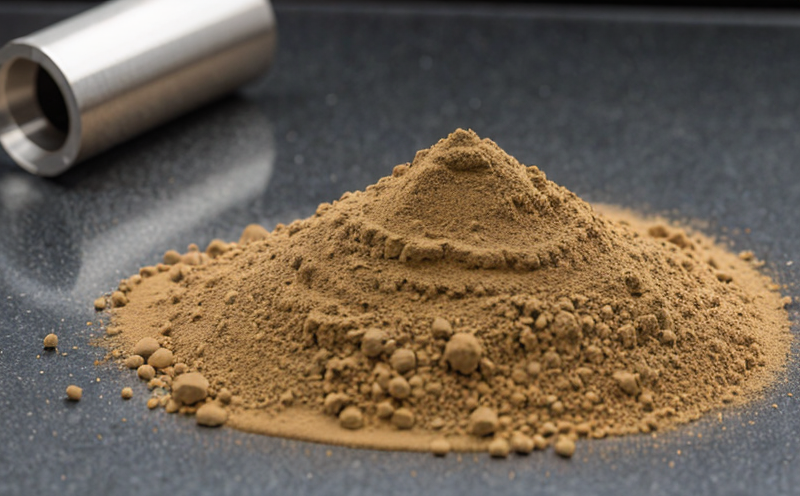ASTM D2216 Moisture Content Testing of Raw Materials
The ASTM D2216 standard method is a critical tool in the additive manufacturing (AM) and 3D printing testing sector, particularly for raw materials characterization. This method provides a standardized approach to determine the moisture content in various types of raw materials used in AM processes. Moisture levels are crucial as they can significantly impact the performance, quality, and reliability of end products.
Raw materials such as polymers, metals, ceramics, and composites that undergo 3D printing or additive manufacturing processes must be free from excess moisture to ensure optimal material properties and print quality. Excessive moisture can lead to warping, cracking, poor adhesion between layers, reduced mechanical strength, and even failure during the build process. Conversely, insufficient moisture may result in brittleness or other undesirable characteristics.
The ASTM D2216 method involves drying a sample of raw material to a constant weight under controlled conditions and then measuring the difference in mass before and after this process. This difference is directly proportional to the moisture content present within the sample. The test provides a quantitative measure that helps manufacturers control quality, ensuring consistency across batches.
For instance, in polymer-based AM processes like fused filament fabrication (FFF), it's essential to maintain precise moisture levels in thermoplastics such as ABS and PLA. In metal additive manufacturing (AM) using powder bed fusion (PBF), the moisture content of alloy powders is critical for achieving the desired microstructure and mechanical properties.
The ASTM D2216 test is particularly useful when integrating new suppliers or raw materials into an existing supply chain, as it ensures that all incoming materials meet the specified quality standards. This method can also be used during in-process quality control to monitor material stability throughout production runs, ensuring consistent performance and reliability.
Furthermore, ASTM D2216 is aligned with broader industry standards aimed at improving AM processes' reproducibility and robustness. By adhering to this standard, manufacturers can ensure that their products meet the stringent requirements set by regulatory bodies like the FDA or aerospace authorities, enhancing overall product quality and safety.
In conclusion, ASTM D2216 moisture content testing is a fundamental step in ensuring high-quality raw materials for additive manufacturing processes. It provides valuable insights into material integrity, which directly influences end-product performance and reliability. This method supports continuous improvement efforts within the AM sector, making it an indispensable tool for quality managers, compliance officers, R&D engineers, and procurement teams.
Why It Matters
The importance of ASTM D2216 moisture content testing in raw materials cannot be overstated. In the context of additive manufacturing (AM) and 3D printing, precision and consistency are paramount for ensuring the quality of end products. Moisture levels play a significant role in determining the success of AM processes, as excessive or insufficient water content can lead to various issues:
- Layer Adhesion Issues: Excessive moisture can cause layers to stick together improperly, leading to poor print quality and increased failure rates.
- Mechanical Properties: Moisture can affect the mechanical properties of raw materials, such as tensile strength and impact resistance, potentially compromising product integrity.
- Warping: In polymer-based AM processes, high moisture levels can cause warping during the curing or drying process, leading to dimensional instability in final products.
- Cracking: Insufficient moisture content may result in brittle materials that are prone to cracking under stress.
By implementing ASTM D2216 moisture content testing, manufacturers can mitigate these risks and ensure that their raw materials meet the necessary quality standards. This not only enhances product performance but also contributes to safer and more reliable end products.
Benefits
- Quality Control: Ensures consistent moisture content, leading to higher-quality raw materials for additive manufacturing processes.
- Process Optimization: Provides insights into the optimal conditions for material processing and drying.
- Cost Efficiency: Reduces waste by minimizing defective products resulting from improper moisture levels.
- Regulatory Compliance: Ensures adherence to industry standards, enhancing compliance with regulatory requirements.
- Innovation Support: Facilitates the development and integration of new raw materials into existing processes without compromising quality or performance.
- Predictive Maintenance: Helps in identifying potential issues early on, allowing for timely interventions to prevent costly downtime.
By leveraging ASTM D2216 moisture content testing, manufacturers can achieve greater control over their production processes, leading to improved product quality and enhanced customer satisfaction. This method also supports the broader goal of advancing additive manufacturing technologies across various sectors.
Eurolab Advantages
At Eurolab, we understand the critical role that ASTM D2216 moisture content testing plays in ensuring high-quality raw materials for additive manufacturing. Our team of experts offers a range of services tailored to meet the unique needs of our clients. Here are some key advantages that come with working with us:
- Accurate and Reliable Results: Our state-of-the-art laboratories employ advanced instrumentation and techniques, ensuring precise moisture content measurements.
- Comprehensive Testing Services: In addition to ASTM D2216 testing, we offer a wide array of other tests that support the entire AM process lifecycle.
- Expertise in Various Materials: Our team has extensive experience working with polymers, metals, ceramics, and composites used in additive manufacturing processes.
- Compliance Support: We ensure that all our testing methods align with international standards such as ASTM D2216, providing clients with the assurance they need for regulatory compliance.
- Custom Solutions: Whether you're a small startup or a large corporation, we offer customized solutions to meet your specific requirements and goals.
- Fast Turnaround Times: Our efficient processes allow us to deliver accurate results quickly, enabling faster decision-making and product development cycles.
Partnering with Eurolab means leveraging our deep industry knowledge and cutting-edge facilities to drive excellence in raw material characterization for additive manufacturing. Contact us today to learn more about how we can support your quality assurance initiatives.





